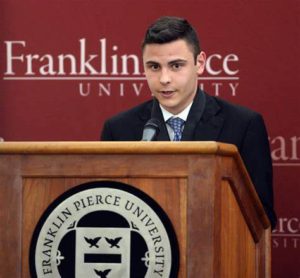The Persistent Bird Catches the Worm: Advice from Stephen Keimig
By: Rachel Ford, July 16th, 2019
Stephen Keimig, writer for FOX News, talked to the students of The Presidency and The Press program hosted by Dr. Kristen Nevious of Franklin Pierce University. Keimig talked with the students about being factually accurate, how to interview politicians, gave them advice on conducting a good interview, and much more.

(Photo credit: Boston Herald)
One of the most important things he emphasized was doing research before students go out and cover a story. He said many people discredit young writers as ones who jump to conclusions and don’t know what they’re talking about. Ensuring the facts are straight and having a bit of background knowledge on the subject will make them seem more credible as journalists.
He also had some good advice when the students asked him about meeting politicians and asking them questions. Keimig suggested keeping questions clear and concise without throwing too many facts at them. Rather than asking a political figure “What are your plans for healthcare?”, instead ask “How would you work to make healthcare more affordable for the average American?” He also suggested that, if they have time to talk to the politician one-on-one, save the harder questions for the end so they don’t get upset and potentially walk away from the interview. However, if they’re at a large gathering and don’t have much time to ask questions, they should ask the tough questions right away, even if they can’t be persistent on getting a straight answer.
Keimig had several good tips on getting a good interview. A good interview, he said, is like a story: it has a beginning, a middle, and an end. He suggested opening the interview with some easy yes/no questions to get the interviewee to feel more comfortable. The middle portion would be asking open-ended questions and following up with other questions on the details they’re providing. The end would be the place to ask the tougher questions before wrapping up the interview. When talking to presidential candidates or other political figures, Keimig told the students to be sure the information they’re getting is new, because people don’t want to hear what’s already been said.
Finally, Keimig talked about the roles of the institution of the presidency and the institution of the press within our democracy. He says that recently, all structure between the press and the president has been thrown out the window. The presidential administration and the media have not been working together to talk about issues. The President and his administration have been failing to explain the reasoning behind the positions they take, and the media pushes so hard for answers that they end up becoming the news rather than reporting it. When these two institutions work against each other rather than with each other, information based on feelings and opinions is spread around the nation rather than the facts of the matter.
He ended on the note that the President should expect to face criticism every single day, because he knows he will have to make decisions that will make some people unhappy. However, it’s the media’s job to neither be negatively critical nor overly boastful on his decisions – they need to report the facts as they are and let the people decide how they feel about them.

Socialize